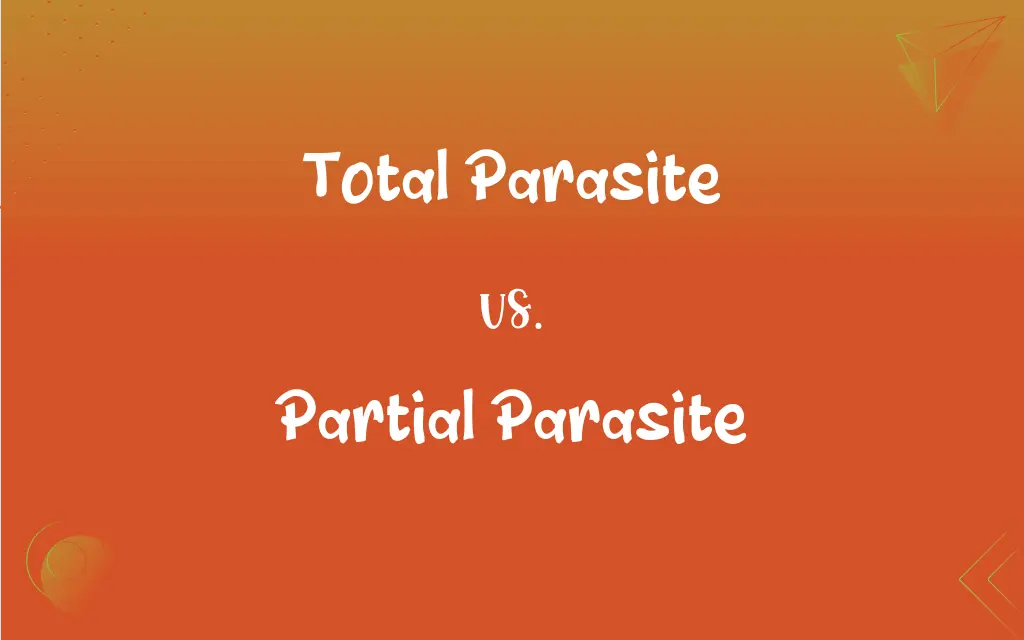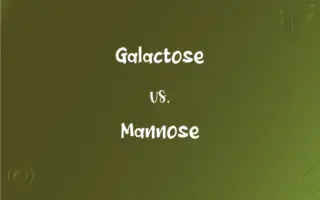Total Parasite vs. Partial Parasite: What's the Difference?
Edited by Aimie Carlson || By Janet White || Published on January 10, 2024
Total parasites completely depend on their host for survival, while partial parasites rely on hosts for some needs but can perform some functions independently.

Key Differences
Total parasites are organisms that rely entirely on their host for all their life processes, such as nourishment and reproduction. In contrast, partial parasites, while still dependent on a host for certain requirements, retain some ability to sustain themselves.
In the case of total parasites, they often lack essential structures for independent living, like chlorophyll in plants. Partial parasites, however, usually possess these structures and can perform some functions, like photosynthesis, on their own.
Total parasites exhibit a complete reliance on their host, often causing significant harm to it. Partial parasites might also harm their host, but their impact is generally less severe due to their partial independence.
Total parasites often have a more specialized host relationship, targeting specific species. Partial parasites tend to be less selective, adapting to a wider range of host species.
The lifecycle of total parasites is intimately tied to their host, with some unable to survive outside this relationship. Partial parasites, while benefiting from a host, can often survive to some extent without one.
ADVERTISEMENT
Comparison Chart
Dependency
Completely dependent on the host.
Partially dependent on the host.
Structural Adaptations
Lacks structures for independent living.
Retains some structures for independence.
Impact on Host
Usually more harmful to the host.
Less harmful compared to total parasites.
Host Specificity
Often highly host-specific.
Less host-specific, more adaptable.
Survival without Host
Cannot survive without host.
Can survive, to an extent, without host.
ADVERTISEMENT
Total Parasite and Partial Parasite Definitions
Total Parasite
A parasite that cannot perform life-sustaining functions independently.
Certain parasitic worms are total parasites, requiring a host to complete their lifecycle.
Partial Parasite
A parasite capable of some independent life processes.
Mistletoes are partial parasites, relying on hosts for water while conducting their own photosynthesis.
Total Parasite
A biological entity entirely subsisting on its host organism.
Some parasitic fungi are total parasites, living exclusively on their host plants.
Partial Parasite
An organism that depends on a host for some, but not all, needs.
The Indian paintbrush is a partial parasite, drawing some nutrients from other plants but also photosynthesizing.
Total Parasite
An organism entirely reliant on its host for survival.
The mistletoe is a total parasite, completely dependent on its host tree for nutrients.
Partial Parasite
A biological entity partially subsisting on its host but retaining some autonomy.
Partial parasites like yellow rattle can photosynthesize but also tap into neighboring plants for resources.
Total Parasite
An entity that fully consumes resources from another without giving anything in return.
The dodder plant is a total parasite, drawing all its sustenance from other plants.
Partial Parasite
An entity deriving partial nourishment or support from another organism.
The beechdrops plant, as a partial parasite, takes some nutrients from beech tree roots.
Total Parasite
An organism that lacks essential life-supporting structures, depending wholly on a host.
Total parasites like certain rootless plants depend entirely on other organisms for nutrients.
Partial Parasite
An organism that partially consumes resources from another, maintaining some independence.
The ghost orchid is a partial parasite, obtaining some sustenance from fungi but also photosynthesizing.
FAQs
Do total parasites perform photosynthesis?
No, total parasites generally lack the ability to perform photosynthesis.
Do total parasites harm their host?
Yes, total parasites often harm their host by fully depending on it for resources.
Are total parasites host-specific?
Many total parasites are highly host-specific, targeting particular species.
What defines a total parasite?
A total parasite is an organism completely reliant on a host for all life processes.
Can total parasites survive without a host?
No, total parasites cannot survive without their host.
Can partial parasites perform photosynthesis?
Many partial parasites can perform photosynthesis to some extent.
Can partial parasites survive without a host?
Partial parasites can often survive, though not optimally, without a host.
Can partial parasites harm their host?
Partial parasites can harm their host, but usually less severely than total parasites.
Do partial parasites have a wider range of hosts?
Yes, partial parasites tend to be less host-specific and more adaptable.
How do total parasites obtain nutrients?
Total parasites obtain all their nutrients directly from their host.
What is a partial parasite?
A partial parasite is an organism that relies on a host for some needs but can perform some functions independently.
Are partial parasites always plants?
No, partial parasites can also be fungi or animals, though many are plants.
Do all parasites fall into these categories?
Most parasites can be categorized as either total or partial, based on their dependency level.
Do total parasites have any beneficial impacts?
Total parasites are generally not considered beneficial to their hosts.
Can the relationship between a parasite and host evolve?
Yes, the relationship between parasites and their hosts can evolve over time.
Are partial parasites less harmful than total parasites?
Generally, partial parasites are considered less harmful than total parasites.
What is an example of a total parasite?
An example of a total parasite is the dodder plant, which completely relies on its host.
What is an example of a partial parasite?
The Indian paintbrush is an example of a partial parasite, partially dependent on other plants.
Is it easy to distinguish between total and partial parasites?
It can be challenging to distinguish, as the level of dependency varies among species.
What structures are missing in total parasites?
Total parasites often lack structures like roots or leaves for independent survival.
About Author
Written by
Janet WhiteJanet White has been an esteemed writer and blogger for Difference Wiki. Holding a Master's degree in Science and Medical Journalism from the prestigious Boston University, she has consistently demonstrated her expertise and passion for her field. When she's not immersed in her work, Janet relishes her time exercising, delving into a good book, and cherishing moments with friends and family.
Edited by
Aimie CarlsonAimie Carlson, holding a master's degree in English literature, is a fervent English language enthusiast. She lends her writing talents to Difference Wiki, a prominent website that specializes in comparisons, offering readers insightful analyses that both captivate and inform.

































































